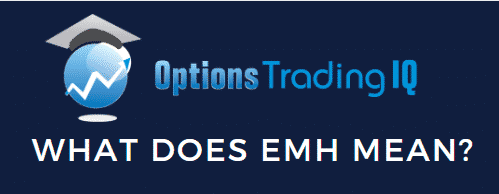

Contents
EMH stands for efficient market hypothesis.
The EMH is a theory that was developed in the 1960s by economist Eugene Fama as a way to explain how financial markets move.
At its core, EMH suggests that markets are efficient, meaning that all participants are rational and prices reflect all known information.
Further, as new information comes to light, this will be priced in immediately, such that the market is always seen to be completely accurate at all times.
EMH goes onto state that unexpected news will cause volatile movements, but once the information is digested by participants, the efficient market will resume once again.
For investors who adhere to this theory, they believe it is impossible for market participants to ever beat the market (that is to say, to obtain returns that are greater than the market average).
This is due to there never being overvalued or undervalued stocks as a result of all known information already being priced in.
The Three Forms Of Efficient Market Hypothesis
The EMH has three forms – weak, semi-strong and strong.
Weak Form
The weak form of EMH states that any future share price moves cannot be predicted using historical data – that is to say, future price moves are unrelated to historical data.
This means that technical analysis will not work and that only fundamental analysis will allow investors to produce better than average returns.
Semi-strong Form
The semi-strong form of EMH states that if the information is publicly available, it has already been factored into the market price.
This means that neither technical analysis nor fundamental analysis will work, as these rely on public information (e.g. balance sheets, company filings, etc).
The only way an investor can make above-average returns in the semi-strong form of EMH is through the use of private information.
Strong Form
The strong form of EMH states that all information is already factored into the market price, including both public and private information.
Under this form, no investor would be able to consistently beat the market and any above-average gains will be a temporary abnormality.
This means that the strong form of EMH would render all forms of analysis, both technical and fundamental, as useless.
The Impact of EMH on Traders and Investors
The debate about whether EMH is valid or not is a hotly contested one.
Ultimately, the outcome of the debate comes down to the beliefs of individual investors and traders, with some agreeing with one of the forms of EMH and others discounting the theory entirely.
This has a direct impact on traders and investors by pushing them towards either passive or active styles of investing and influencing the use of technical and fundamental analysis.
For those that support EMH, since all information is already priced in and investors cannot beat the market, they instead focus on merely matching the market.
As a result, these investors will choose to use index funds and exchange-traded funds (ETFs) to simply mirror an index and achieve the same returns as the overall market.
The only way that these investors believe that excess returns can be made is to take on additional risks, such as leveraging their position.
For those investors that are critics of EMH, they believe it is possible to find pockets of inefficient pricing in the market.
As a result, they take on a more active approach, preferring to trade stocks using one or both of technical and fundamental analysis.
The main argument that proponents of EMH have is that passive index funds have outperformed the vast majority of active fund managers.
Numerous studies have found this to be the case, including Morningstar’s 2019 report which found that over a ten-year period to June 2019, only 23% of active funds were able to beat the average returns of passive funds.
Even Warren Buffett has waded into the debate in the past, successful making a $1 million bet for charity that a passive index fund would be able to beat 5 active funds selected by an active fund manager.
Conclusion
The Efficient Market Hypothesis states that markets are efficient, meaning that all participants are rational and prices reflect all known information.
The implication for investors is that it is better to simply buy and hold a passive index fund as an active manager would not be able to beat the market average over the long term.
Evidence to date has pointed to this being largely the case, although some individual traders have managed to make consistent, multi-year profits.
The degree to which an investor believes in the EMH will influence whether they use technical and/or fundamental analysis or choose to simply buy and hold passive index funds.
Trade safe!
Disclaimer: The information above is for educational purposes only and should not be treated as investment advice. The strategy presented would not be suitable for investors who are not familiar with exchange traded options. Any readers interested in this strategy should do their own research and seek advice from a licensed financial adviser.










